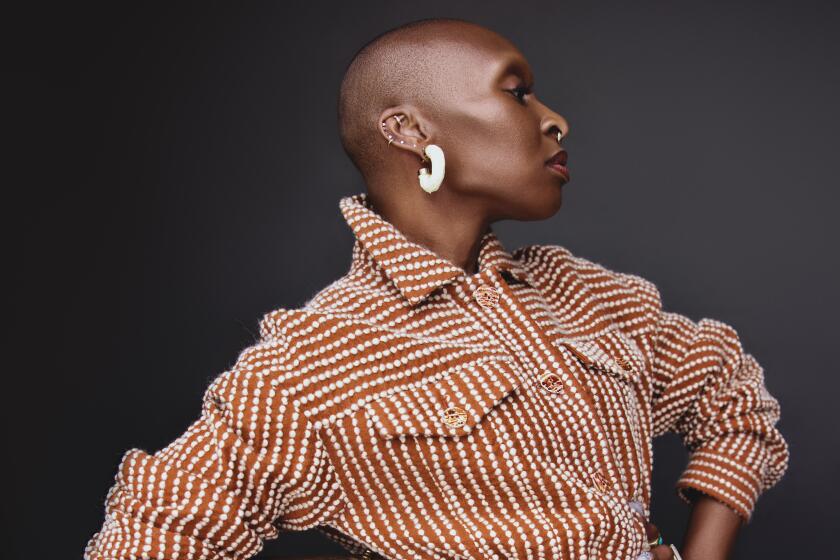Meryl Streep is queen of Netflix’s ‘Prom,’ an LGBTQ message musical gone Hollywood
- Share via
As incarnated by Meryl Streep in the Ryan Murphy movie musical “The Prom,” Dee Dee Allen is a fading Broadway star stitched together à la Frankenstein from various divas. She flounces like Liza Minnelli, shimmies like Shirley MacLaine and bellows like Patti LuPone — all the while mugging for an invisible camera as though auditioning for the role of Norma Desmond in Andrew Lloyd Webber’s version of “Sunset Boulevard.”
Having just opened a new musical about Eleanor Roosevelt, Dee Dee is waiting with her co-star, Barry Glickman (James Corden), for the reviews to declare their show a hit. The Champagne starts flowing when the New Jersey Star-Ledger loves it. But the New York Times hammers a coffin nail so hard that Dee Dee and Barry fear their future will be nothing but understudy gigs on the dinner theater circuit.
The stars of “Eleanor! The Eleanor Roosevelt Musical” drown their sorrows at Sardi’s, where they commiserate with two other down-on-their-luck troupers, aging chorus girl Angie Dickinson (Nicole Kidman) and Juilliard grad turned sitcom star turned bartender Trent Oliver (Andrew Rannells). Amid the orgy of self-pity, a lightbulb goes off: To rehabilitate their careers, they need to transform themselves into celebrity activists, taking up a cause that will prove to the world that they’re not washed-up narcissists but theater people with genuine heart.
Scrolling tipsily through Twitter, Angie learns about a young lesbian high school student in Indiana whose prom was canceled by the PTA when word got out that she was planning to bring her girlfriend. The story has gone viral, and before you know it these desperate hams are boarding a road company bus to the Midwest to turn around their publicity by helping Emma (Jo Ellen Pellman) become prom queen.
When these thespian do-gooders show up at her school with press agent Sheldon Saperstein (Kevin Chamberlin) in tow, an angry meeting about the canceled prom is already in session. “Who are you people?” asks an indignant Mrs. Greene (Kerry Washington), the head of the PTA, who is fanning the flames of intolerance.
“We are liberals from Broadway,” announces Trent, his Juilliard elocution inaugurating a nutty new chapter in the culture wars.
On Broadway, where “The Prom” had its premiere in 2018, the laughter provoked by the musical’s setup was of gale force. Played by Broadway veterans (Beth Leavel and Brooks Ashmanskas) for an audience primed for backstage histrionics, the show seemed to float on a cloud of camp.
High hilarity, unfortunately, proved difficult to sustain. Schmaltz intervened. As the musical stretched on, the book by Bob Martin and lyricist Chad Beguelin and music by Matthew Sklar turned generic.
The dynamics are reversed in the starry screen version, which starts on Netflix on Dec. 11 following a limited theatrical release Friday wherever cinemas (or drive-ins) are open. The movie musical, shot up with Hollywood steroids under Murphy’s direction, strains to replicate the show’s opening exuberance. Streep, Corden, Kidman and Rannells are game, but there’s an ersatz quality to the film. Lacking the charming touches of Al Hirschfeld, these Broadway caricatures seem manufactured in a cartoon studio in Burbank.
Corden makes Barry’s outbursts of singing and dancing seem perfectly natural, but not everyone carries a musical inside them. Rannells may be too much in his element, while Kidman appears in danger of being chewed up with the scenery her castmates are pigging out on.
Streep will delight all who savor the sillier side of the Oscar-winning grand dame. She pulls out all the Evita stops in her Indiana entrance number, “It’s Not About Me,” in which Dee Dee, strutting into the school auditorium as if it were Radio City Music Hall during the Tony Awards, protests that she’s not a celebrity carpetbagger. The fun isn’t so much about Dee Dee as watching Streep play a faltering prima donna to the hilt.
Mr. Hawkins, the school principal amiably embodied by Keegan-Michael Key, is Emma’s defender in the battle against Mrs. Greene (a character expanded in the film and given sharper edges by Washington). He’s also a Dee Dee Allen fan. “What kind of fan?” she demands to know, unaccustomed to virile heterosexual men taking an interest in her work.
A romance tentatively blossoms. It’s a refreshing reversal of the usual Hollywood practice of pairing nubile women with older-model men, but Murphy’s casting choices carry a neon glow.
There’s a reason beyond star power for recruiting Streep. And in a moment so small it’s easy to miss, she changes the climate of the film.
It happens in the lobby of the hotel, when Mr. Hawkins remarks to Dee Dee how nice it is to see Emma smile again. He explains that she has been having a hard time, even before all the prom controversy. Her parents threw her out of the house, at age 16, when she came out.
Dee Dee registers the meaning of this information beyond its public relations value. In a mere twitch, Streep finds a way of underscoring the film’s purpose even as she continues to spray theatrical whipped cream.
What’s perhaps most stirring about Murphy’s film is the commitment of his A-list talent to the cause of LGBTQ acceptance. “The Prom” flirts at moments with being the most elaborate public service announcement ever created, but I was moved by the scale of the sentiment.
Corden’s Barry, who says of himself, “I’m as gay as a bucket of wigs,” shares his own torment of being rejected by his parents. Corden, a straight, married dad, may not have direct experience of what Barry faced. His cliched queening should permanently bar him from ever getting cast in “La Cage aux Folles.” But the depth of pain in Corden’s dramatic interactions with Streep is courageous. The scars of stigma revealed in his performance seem true.
Viola Davis is the legendary blues singer opposite Colman Domingo and Glynn Turman in this strong Netflix adaptation of August Wilson’s play.
Kidman initially seems too big a star for the role of Angie, a day drinker who bemoans that everyone, including Tina Louise from “Gilligan’s Island,” has gotten to play Roxie Hart in “Chicago” except her.
But in bucking up Emma for the public fight ahead, Angie grows in sympathetic interest. The fast friendship between these characters affords Kidman a Bob Fosse moment when Angie shows an agog Emma the empowering meaning of “zazz.”
The innocent simplicity of Pellman’s Emma stands in stark contrast to the frazzled grandiosity of her Broadway rescuers. Her semi-secret relationship with Alyssa Greene (an appealing Ariana DeBose) — yes, the daughter of the PTA’s anti-gay rabble-rouser — is complicated but touching in its wholesomeness.
Murphy has made a progressive musical for the heartland. Compassion, inclusiveness and forgiveness are the prevailing themes in a film that enlists Tracey Ullman and Mary Kay Place (in mother and grandmother roles) to put these values into practice.
If the musical numbers are more energetic than memorable, the finale brings all sides together in a euphoric glimpse of utopia. “The Prom” sometimes seems of a piece with the shopping mall settings that are central to the film. But what’s being glamorously sold is an embrace of difference.
'The Prom'
Rating: PG-13 for thematic elements, suggestive/sexual references and language
Running time: 2 hours, 12 minutes
Playing: Starts Friday at Vineland Drive-in, City of Industry, and in limited release where theaters are open; available Dec. 11 on Netflix
More to Read
The biggest entertainment stories
Get our big stories about Hollywood, film, television, music, arts, culture and more right in your inbox as soon as they publish.
You may occasionally receive promotional content from the Los Angeles Times.











